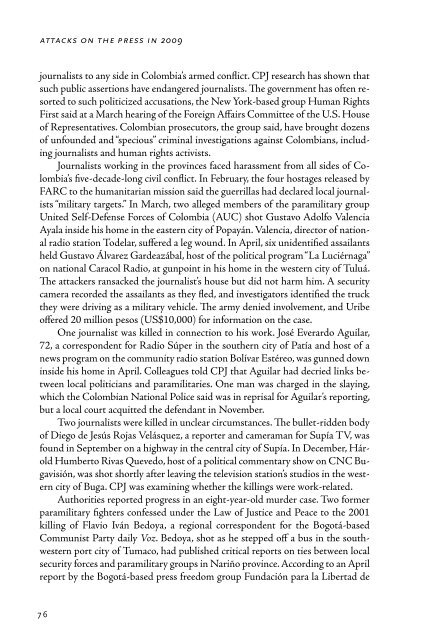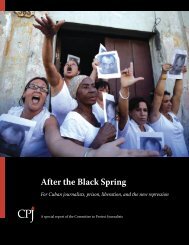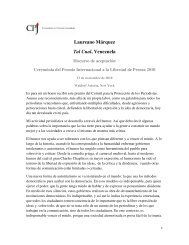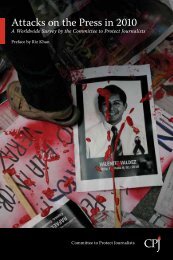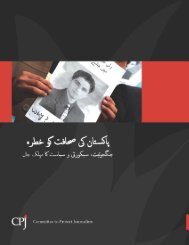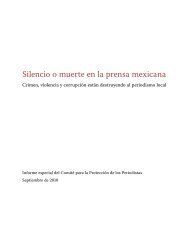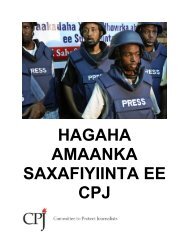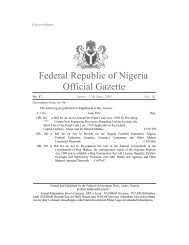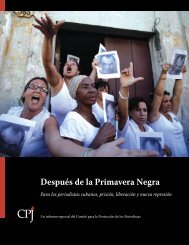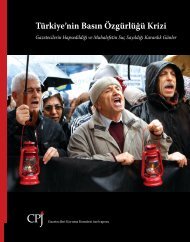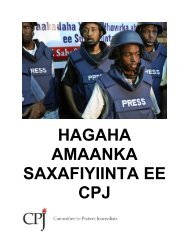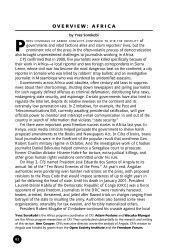Attacks on the Press - Committee to Protect Journalists
Attacks on the Press - Committee to Protect Journalists
Attacks on the Press - Committee to Protect Journalists
- No tags were found...
Create successful ePaper yourself
Turn your PDF publications into a flip-book with our unique Google optimized e-Paper software.
attacks <strong>on</strong> <strong>the</strong> press in 2009americas: cubajournalists <strong>to</strong> any side in Colombia’s armed c<strong>on</strong>flict. CPJ research has shown thatsuch public asserti<strong>on</strong>s have endangered journalists. The government has often resorted<strong>to</strong> such politicized accusati<strong>on</strong>s, <strong>the</strong> New York-based group Human RightsFirst said at a March hearing of <strong>the</strong> Foreign Affairs <strong>Committee</strong> of <strong>the</strong> U.S. Houseof Representatives. Colombian prosecu<strong>to</strong>rs, <strong>the</strong> group said, have brought dozensof unfounded and “specious” criminal investigati<strong>on</strong>s against Colombians, includingjournalists and human rights activists.<strong>Journalists</strong> working in <strong>the</strong> provinces faced harassment from all sides of Colombia’sfive-decade-l<strong>on</strong>g civil c<strong>on</strong>flict. In February, <strong>the</strong> four hostages released byFARC <strong>to</strong> <strong>the</strong> humanitarian missi<strong>on</strong> said <strong>the</strong> guerrillas had declared local journalists“military targets.” In March, two alleged members of <strong>the</strong> paramilitary groupUnited Self-Defense Forces of Colombia (AUC) shot Gustavo Adolfo ValenciaAyala inside his home in <strong>the</strong> eastern city of Popayán. Valencia, direc<strong>to</strong>r of nati<strong>on</strong>alradio stati<strong>on</strong> Todelar, suffered a leg wound. In April, six unidentified assailantsheld Gustavo Álvarez Gardeazábal, host of <strong>the</strong> political program “La Luciérnaga”<strong>on</strong> nati<strong>on</strong>al Caracol Radio, at gunpoint in his home in <strong>the</strong> western city of Tuluá.The attackers ransacked <strong>the</strong> journalist’s house but did not harm him. A securitycamera recorded <strong>the</strong> assailants as <strong>the</strong>y fled, and investiga<strong>to</strong>rs identified <strong>the</strong> truck<strong>the</strong>y were driving as a military vehicle. The army denied involvement, and Uribeoffered 20 milli<strong>on</strong> pesos (US$10,000) for informati<strong>on</strong> <strong>on</strong> <strong>the</strong> case.One journalist was killed in c<strong>on</strong>necti<strong>on</strong> <strong>to</strong> his work. José Everardo Aguilar,72, a corresp<strong>on</strong>dent for Radio Súper in <strong>the</strong> sou<strong>the</strong>rn city of Patía and host of anews program <strong>on</strong> <strong>the</strong> community radio stati<strong>on</strong> Bolívar Estéreo, was gunned downinside his home in April. Colleagues <strong>to</strong>ld CPJ that Aguilar had decried links betweenlocal politicians and paramilitaries. One man was charged in <strong>the</strong> slaying,which <strong>the</strong> Colombian Nati<strong>on</strong>al Police said was in reprisal for Aguilar’s reporting,but a local court acquitted <strong>the</strong> defendant in November.Two journalists were killed in unclear circumstances. The bullet-ridden bodyof Diego de Jesús Rojas Velásquez, a reporter and cameraman for Supía TV, wasfound in September <strong>on</strong> a highway in <strong>the</strong> central city of Supía. In December, HároldHumber<strong>to</strong> Rivas Quevedo, host of a political commentary show <strong>on</strong> CNC Bugavisión,was shot shortly after leaving <strong>the</strong> televisi<strong>on</strong> stati<strong>on</strong>’s studios in <strong>the</strong> westerncity of Buga. CPJ was examining whe<strong>the</strong>r <strong>the</strong> killings were work-related.Authorities reported progress in an eight-year-old murder case. Two formerparamilitary fighters c<strong>on</strong>fessed under <strong>the</strong> Law of Justice and Peace <strong>to</strong> <strong>the</strong> 2001killing of Flavio Iván Bedoya, a regi<strong>on</strong>al corresp<strong>on</strong>dent for <strong>the</strong> Bogotá-basedCommunist Party daily Voz. Bedoya, shot as he stepped off a bus in <strong>the</strong> southwesternport city of Tumaco, had published critical reports <strong>on</strong> ties between localsecurity forces and paramilitary groups in Nariño province. According <strong>to</strong> an Aprilreport by <strong>the</strong> Bogotá-based press freedom group Fundación para la Libertad dePrensa, paramilitary fighters have c<strong>on</strong>fessed under <strong>the</strong> law <strong>to</strong> participati<strong>on</strong> inseven o<strong>the</strong>r journalist murders.In a landmark case in <strong>the</strong> fight against impunity, a court in nor<strong>the</strong>rn Santanderprovince c<strong>on</strong>victed three former public officials <strong>on</strong> charges of plotting <strong>the</strong>2003 murder of radio commenta<strong>to</strong>r José Emeterio Rivas. The prosecuti<strong>on</strong>’s keywitness was demobilized paramilitary fighter Pablo Emilio Quintero Dodino,who c<strong>on</strong>fessed <strong>to</strong> <strong>the</strong> shooting during a Law of Justice and Peace hearing. FormerBarrancabermeja Mayor Julio César Ardila Torres was sentenced <strong>to</strong> 28 yearsin pris<strong>on</strong>, while former public works officials Abelardo Rueda Tobón and FabioPajón Lizcano each received sentences of 26 years and eight m<strong>on</strong>ths. Rivas, 44, acommenta<strong>to</strong>r for <strong>the</strong> local Radio Calor Estéreo, was killed in retaliati<strong>on</strong> for hisreports <strong>on</strong> official corrupti<strong>on</strong> and links between Ardila’s administrati<strong>on</strong> and paramilitarygroups, <strong>the</strong> At<strong>to</strong>rney General’s office said.CUBAt o p developments»»Vibrant blogging culture emergesdespite severe Internet restricti<strong>on</strong>s.»»Jailed journalists suffer amid inhumanec<strong>on</strong>diti<strong>on</strong>s.2 2key statisticReporters and edi<strong>to</strong>rs in jail as ofDecember 1, 2009.Cuba was hit hard by <strong>the</strong> global ec<strong>on</strong>omic crisis and enduredan upheaval in its highest offices, but state-c<strong>on</strong>trolled news media deliveredsuperficial and skewed coverage. Human rights c<strong>on</strong>diti<strong>on</strong>s, including press freedom,remained at a standstill:Independent journalistsfaced <strong>on</strong>going harassment,and more than 20 reportersand edi<strong>to</strong>rs remained in jail.But offering a flicker of hopefor freedom of expressi<strong>on</strong> <strong>on</strong><strong>the</strong> island, a growing communityof independent bloggersmaneuvered around legal,ec<strong>on</strong>omic, and technologicallimitati<strong>on</strong>s <strong>to</strong> describe everydayexperiences and express opini<strong>on</strong>s that challenged <strong>the</strong> regime’s perspective.Cuba was <strong>on</strong>e of <strong>the</strong> 10 Worst Countries <strong>to</strong> Be a Blogger, according <strong>to</strong> an Aprilanalysis by CPJ. But because <strong>the</strong> government so harshly represses o<strong>the</strong>r media, <strong>the</strong>Internet has become <strong>the</strong> <strong>on</strong>e means by which Cubans are able <strong>to</strong> exercise free expressi<strong>on</strong>.The government estimates Internet penetrati<strong>on</strong> at 13 percent, althoughindependent estimates are much lower.Regardless, <strong>the</strong> Internet in Cuba is extremely slow and expensive, and legal7 67 7


